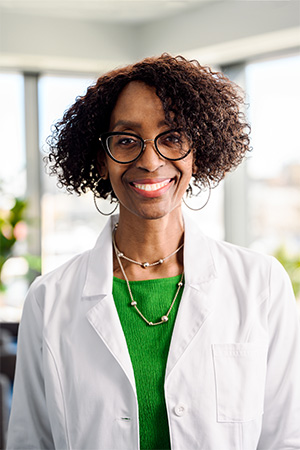I believe you don’t have to share a room to share a moment. I am Henry.
 For a variety of reasons, Dr. Tisa Johnson considers herself blessed. First, because she gets to work with children every day. As the medical director of Henry Ford Health’s Center for Autism and Developmental Disabilities (CADD) and the interim chairperson of our pediatrics division, she appreciates that the only part of her day that feels like work is the paperwork side of things.
For a variety of reasons, Dr. Tisa Johnson considers herself blessed. First, because she gets to work with children every day. As the medical director of Henry Ford Health’s Center for Autism and Developmental Disabilities (CADD) and the interim chairperson of our pediatrics division, she appreciates that the only part of her day that feels like work is the paperwork side of things.
“I think in a world where people work every single day, it is a blessing to go to work and truly look forward to what you do,” Dr. Johnson remarks.
But Dr. Johnson also feels fortunate that she knew from the moment she got to college that she wanted to pursue a career in pediatric medicine. Knowing what she wanted to do from an early age allowed her to put her focus on how she wanted to do it. More specifically, she wanted to explore opportunities to engage children with special needs in different and more impactful ways.
Most recently, she’s been inspired by how virtual care has taken off, and how it serves the needs of kids with autism particularly well—depending upon the child.
“We went into the pandemic, and I really was not thinking a virtual platform would be effective,” admits Dr. Johnson. “But we pivoted out of necessity. We developed the virtual platform, we refined it…I would almost say, perfected it. I believe it’s not “as good”—but, really, better in some ways than an in-person evaluation.”
 She’s learned that virtual care is especially helpful in allowing her to see a child in their true environment—where they’re relaxed and comfortable. In the office-setting, kids with autism can be very guarded. Parents will often say that their kids weren’t their “true selves” during such a visit.
She’s learned that virtual care is especially helpful in allowing her to see a child in their true environment—where they’re relaxed and comfortable. In the office-setting, kids with autism can be very guarded. Parents will often say that their kids weren’t their “true selves” during such a visit.
The new virtual platform, conversely, allows multiple specialists to evaluate and observe a child at the same time—in a low-pressure environment. Further, it gives families across the state and in the upper peninsula access to highly specialized care. These people previously would have to drive several hours to see a specialist who understands their child’s condition.
Next on the agenda? Dr. Johnson hopes to take the virtual platform and leverage its success to allow specialists like herself to offer care to children globally—from the comfort of their offices and homes.
She acknowledges that the goal is ambitious. But she believes it’s something that can occur within the next five years without a doubt. Much like the pandemic put the exploration and evolution of virtual care on the fast track, Dr. Johnson believes Henry Ford Health can build upon that momentum to help children—literally everywhere.
Regarding autism, Dr. Johnson notes that children with autism vary in their abilities, interests and areas of relative weakness. To know a child with autism is really just to know that one child. Because they’re on a spectrum, and because every child is unique. So, it’s important to be patient—to ask questions—and always keep an open mind and heart.
.svg?iar=0&hash=F6049510E33E4E6D8196C26CCC0A64A4)

/hfh-logo-main--white.svg?iar=0&hash=ED491CBFADFB7670FAE94559C98D7798)